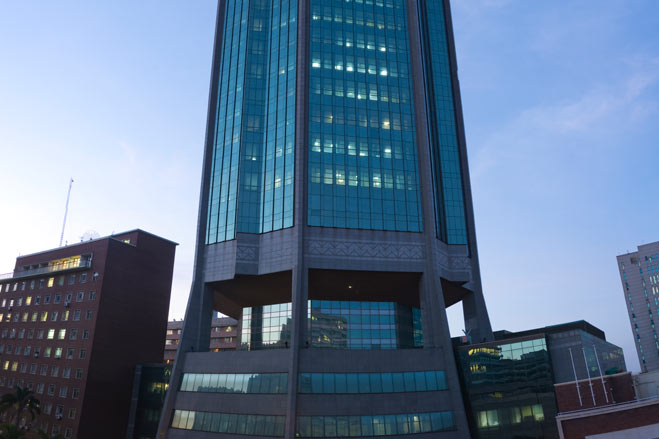
On either side of the bustling Samora Machel Avenue — the Wall Street of Zimbabwean banking— lies the remnants of what used to be two thriving banks: Trust Bank and Interfin.
BY NDAMU SANDU
At Trust Towers, Trust Bank Corporation logos are still there on the doors on the ground floor.
Across the road, another bank that used to rival Trust closed some years back. The bank used to be called Century Bank, then CFX and eventually morphing into Interfin Bank.
Since the deregulation of the financial services sector, a number of banks opened up. The majority of them were owner-managed and associated with a person — Roger Boka’s United Merchant Bank, David Chapfika’s Universal Merchant Bank, Nicholas Vingirai’s Intermarket, Nigel Chanakira’s Kingdom, William Nyemba’s Trust, Jeffrey Mzwimbi’s Royal, Mthuli Ncube’s Barbican and Patterson Timba’s ReNaissance Merchant Bank (RMB).
Royal Bank made a royal entry but exited the market, not once but twice. The same fate befell Trust, having been amalgamated into the Zimbabwe Amalgamated Banking Group alongside Royal and Barbican.
By the time AfrAsia Bank Zimbabwe (formerly Kingdom), collapsed, Chanakira had already left the institution. Vingirai’s Transnational Holding Limited was recently given 26% shareholding in ZB Financial Holdings as compensation for the loss of his banking group a decade ago.
Also interred in the banking cemetery are remains of Allied Bank, Capital Bank, Genesis Investment Bank and First National Building Society, among others. The collapse of indigenously owned banks reverses the gains of indigenisation following the deregulation of the sector in the 90s.
- Chamisa under fire over US$120K donation
- Mavhunga puts DeMbare into Chibuku quarterfinals
- Pension funds bet on Cabora Bassa oilfields
- Councils defy govt fire tender directive
Keep Reading
What causes this carnage?
Economist Prosper Chitambara said the closure of the indigenous banks had to do with weak corporate governance structures.
“If you look at non-performing loans, the indigenously-owned banks have been more affected than their foreign counterparts. Corporate governance is important. We need to strengthen banking supervision, monitoring and surveillance so that we minimise the incidences of bank closures,” Chitambara said.
The causes of collapse have been the same — undercapitalisation, poor corporate governance, insider non-performing loans and abuse of depositors’ funds akin to declaration of dividend to shareholders.
Regulators have on a number of occasions been caught napping, only to respond when the crisis had engulfed a banking institution, with critics accusing the monetary authorities of closing the stables when the horses have already bolted.
In a report after the collapse of RMB, the Reserve Bank of Zimbabwe noted that there was a high credit risk at RMB “as evidenced by a high level of non-performing loans of 38% of the total loan book of $53,1 million as at March 31 2011”.
It further said that total insider borrowings of $12,4 million, (which included exposure to ReNaissance Financial Holdings), Timba and his relatives exceeded 25% of the bank’s capital base in violation of banking rules.
A banker told Standardbusiness that the absence of capital was the bane for local banks. He said before the dollarisation of the economy, all banks were fully capitalised. When the economy dollarised in 2009, there was no conversion of the old balances into new ones.
“So in 2009, banks had to start all over again. They became start up projects. RBZ felt banks needed time which was not a solution. It came up with supportive measures which included accepting movable and immovable assets as capital, which should never have happened,” a banker said on Friday.
“We lived with it in the hope that things would get better to replace the pseudo capital. It was difficult for banks that had not been allowed to do ‘nefarious’ activities such as buying property, currency and stocks to hedge against inflation.”
Another banker blamed the collapsing economy for the collapse of indigenous banks.
“Over 5 000 corporates have since closed shop and most of these would have been supported mainly by indigenous banks. So naturally, you don’t expect the banks to survive,” a banker said.
He said there was lack of deliberate support from government, unlike in some countries which do not allow banks to close.
“Government should have taken over any such bank except in a very hopeless case. The shareholders would always be allowed to buy back such saved entities once the situation improves,” the banker said.
An analyst told Standardbusiness that volatile and inconsistent policies by RBZ and government scared away potential investors.
“After dollarisation all indigenous banks needed to attract fresh capital. As a country, we therefore needed conducive policies to attract foreign capital as locally we don’t produce, manufacture or print this currency [US$],” he said.
An executive with a leading commercial bank said RBZ minimum equity capital was increased to unprecedented levels in contrast to the operating economic environment.
“When a country is struggling to raise capital, you don’t worsen it by increasing capital to unrealistic levels. Banks in some countries start with as little as $3 million. We were on $12,5 million.
“Then it was doubled to $25 million and immediately after to $100 million. Even South Africa is on $40 million,” the executive said.
“It therefore defies any logic for anyone to suggest $100 million when you are struggling to attract capital. This scared many potential investors, some of whom were on the verge of concluding deals.”
RBZ was also accused of not treating banks equally. Some banks would receive liquidity support through the lender of last resort window — an opportunity which other banks were denied.
A banker said the perception that foreign banks would be rescued by their offshore parents whereas the indigenous banks had no fall-back position could not help matters.
Yet there are other local banks that have weathered the storm — FBC, CBZ and ZB Bank — thanks to a strong shareholder such as the National Social Security Authority. Formerly Premier Finance Group has attracted pan-African bank, Ecobank, while NMB has lured strong European shareholders.











